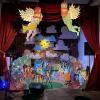Queer Revolutions: Alex Suarez Celebrates Intersectionality with 'Femme'
Art Notes
In conversation with Alex Suarez about the origins of their drag show Femme, launched in January and now two shows into its second season, they spoke about using the vibrancy of revolutionary femme-bodied narratives to create a space in Athens that is resounding with differently gendered persons allowed to exist fully as they are.
“The word ‘femme’ has such power to me… the [queer] revolution was led by the drag queens, and the femmes, and the trans women… we wouldn’t be able to do the things we do if it weren’t for the femmes who led that revolution and the people who were identifying as women leading that charge, and throwing those bricks and being at those protests… And if it weren’t for people like Sylvia Rivera and Marsha P. Johnson and all of those strong women, all those femmes.”
Suarez began their personal drag career in January 2017. Two years later, they started Femme, a monthly, intersectional performance that, instead of working with theme nights and only drag queens, plays with the concept of bringing in differently gendered drag performers and allowing complexity and variety to take precedence. “I wanted to create a night where you can drop your guard and also see different talent that embodies different things,” says Suarez. “I want to put [the performers] in a place where they are very seen.”
Talking about their own gender, Suarez speaks about having masculine traits, feminine qualities, femme personas, butch trappings and masc-isms all wrapped into one person. Rather than engaging a singular gender, Suarez performs and embodies all of these, letting them mix together or allowing one to take the spotlight if need be, whether in drag or out of drag. “Even not being in drag, I still feel like Queen Alex Suarez… But when I’m in drag, I still also very much feel like the first 20 years of my life—that Alex exists in that body, as well. I very much exist in the middle.”
Insistence on flamboyant, vivacious existence can be seen in both Suarez and in Femme: There is not a performance that isn’t an entanglement of genders and identities.
“I have kings; I have queens; I have things. I have non-gender-conforming drag personas,” says Suarez, talking about the inclusion of differently gendered performers in Femme, including burlesque dancers, who were originally part of drag show lineups. Femme surpasses the quota-driven concepts of diversity and drops straight to intersectionality. There isn’t a number of alternative identities to be filled, and there isn’t a script that’s being followed.
“Femme is about having a fresh mix of performers every month so people get a new show every time,” says Suarez. “And then, my assignment to all of those performers is, ‘Bring your bread and butter, bring your best, bring the things that you really like to do, or the things that your community doesn’t exactly expect you to do.’”
In the last seven months of Femme—now starting on a second season after a summer-long break—there have been incredible moments, like queen Dynisty St. James singing a number, performer Taylor Alxndr (who runs the Church shows in Atlanta) performing to Lizzo’s song “Juice,” Priscilla Chambers (a trans woman who airs on the third season on the Boulet Brothers’ “Dragula”) coming down from Nashville to perform and the uproarious response to the appearance of a burlesque performer during the first Femme show that each speak power to queer femme identity. Audiences of queer, trans, nonbinary and allied genders have rallied around Femme to pack out each show.
There’s a Southernness to Femme that Suarez describes through the architecture of Church bar. “I think where [Femme] comes into this Southern identity is that we are kind of just performing in a space that isn’t really a show space. It’s this little nook, and we are all very packed in there… It’s like we are very much part of the crowd, and we’re very much on the level, and it is this really nitty gritty, it’s this raw kind of talent that is out there on the floor… You’re part of the party.”
Shows like Femme, and queer leaders like Suarez, don’t just protest spaces of harmful binary or cisgendered social normatives that exlude queer, trans and nonbinary persons. These queer movements twirl past those constructs towards a flamboyant resilience—one that allows femme identities to resound both in the moment of performance and elsewhere. Through this, performance ceases to be an escape or a hiding place. It becomes an existence.
The next Femme show is Thursday, Oct. 3 at Sister Louisa’s Church at 9:30 p.m. The lineup includes Atlanta performers St. Lucia (a fellow competitor on season three of “Dragula”), Syraja Sinclair Dupree and Royal Tee, plus Colana Bleu, the “MuuMuu Mistress of Auburn.” DJ Quincy will lead the music, and Suarez will keep spots open for newer performers. Keep up to date with upcoming Femme shows on Suarez’s Instagram, @queenalexsuarez.
Calendar
-
Thursday, October 3
Sister Louisa's Church
Femme
Alex Suarez hosts an evening of performances by St. Lucia (from season three of "Dragula"), Syraja Sinclair Dupree, Royal Tee and Colana Bleu. See Art Notes on p. 14.













comments